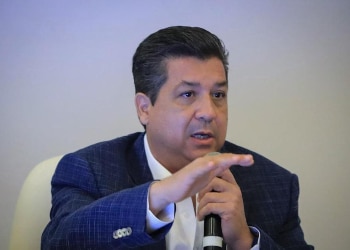Time appears to be running out for the governor of the US-Mexico border state of Tamaulipas – after lawmakers stripped him of his immunity from prosecution and US officials shared their own investigation into his alleged criminal activity.
Mexico’s Attorney General’s Office announced on May 10 that the US Justice Department had shared its case file on Governor Francisco García Cabeza de Vaca. The investigation provides information on alleged illegal money transfers and other banking irregularities, according to prosecutors.
This comes after the Chamber of Deputies – Mexico’s lower house of Congress – voted on April 30 to remove the embattled governor’s immunity after he was charged with organized crime, money laundering and tax evasion.
The state congress of Tamaulipas objected to the decision and chose to allow Cabeza de Vaca to remain in office, according to local media reports. Mexico’s Supreme Court will now rule on the case.
Cabeza de Vaca is suspected of links to organized crime groups and laundering illicit funds while in office, according to the Attorney General’s Office. Prosecutors allege the governor amassed a multimillion-dollar fortune that does not match his income as a public official.
This includes scores of hidden assets, including 30 properties located in Texas and Tamaulipas valued at around 951 million Mexican pesos (around $47 million) that were purchased by front companies tied to his family, according to Animal Político.
SEE ALSO: Mexico News and Profiles
Prosecutors allege that he operated a shadowy network within his state government between 2016 and 2019, handing out public contracts to companies that benefited several members of his family.
Cabeza de Vaca has rejected these accusations, calling the hearing to remove his immunity a “hoax” and a “political and criminal lynching orchestrated by the government.”
President Andrés Manuel López Obrador has called for patience, as the courts make a final ruling.
But with rumors swirling about whether Cabeza de Vaca has already fled Mexico for the United States, he joins the line of Tamaulipas governors who have wound up on the wrong side of the law.
InSight Crime Analysis
Controversy has long surrounded Cabeza de Vaca’s career as a public official with the conservative National Action Party (Partido de Acción Nacional — PAN), especially during his time as governor of Tamaulipas.
Before becoming state governor, Cabeza de Vaca was accused of having links to the Gulf Cartel and using some of the group’s illicit proceeds to finance his campaign for mayor of the US-Mexico border city of Reynosa. While mayor between 2005 and 2007, he allegedly granted special permission to Gulf Cartel kingpin Osiel Cárdenas Guillén to hold a public “Children’s Day” event in 2006. The former Gulf Cartel head is now serving a 25-year prison sentence for overseeing a “vast drug trafficking empire” that imported thousands of kilograms of cocaine and marijuana into the United States.
US and Mexican officials have both targeted Cabeza de Vaca’s alleged criminal activity during his tenure as governor. In 2020, the organized crime unit (Subprocuraduría Especializada en Investigación de Delincuencia Organizada — SEIDO) of Mexico’s Attorney General’s Office opened a money laundering probe. The unit reportedly obtained telephone wiretaps from the US Drug Enforcement Administration (DEA) that may link Cabeza de Vaca to illicit proceeds from organized crime groups.
SEE ALSO: Elites, Organized Crime Share Long History in Tamaulipas, Mexico
More recently, Cabeza de Vaca came under fire after authorities arrested several members of an elite special operations group (GOPES) — some of whom received US training – in the January massacre of 19 people near the US-Mexico border. The GOPES – formed in 2017 out of the Tamaulipas Center for Analysis, Information and Studies (Centro de Análisis, Información y Estudios de Tamaulipas — CAIET) – report directly to Cabeza de Vaca.
Despite this and other alleged misconduct, Cabeza de Vaca has maintained good standing with US officials, meeting with powerful senators in the state of Texas and working on bi-national security initiatives with Customs and Border Protection (CBP). At home, the Mexican Navy even honored him on April 21 for his security work in the state.
Cabeza de Vaca, however, has been put on the defensive by the stream of public allegations of financial misdeeds and ties to dirty money from organized crime. In mid-April, he hired a US law firm to “mitigate the effects” of confidential financial information allegedly leaked by Mexican officials, according to public disclosures to the US Treasury Department under the Foreign Agents Registration Act (FARA). His lawyer also wrote a letter to the director of the US Financial Crimes Enforcement Network (FinCEN) urging them to “investigate what appear to be continuing leaks against my client.”

